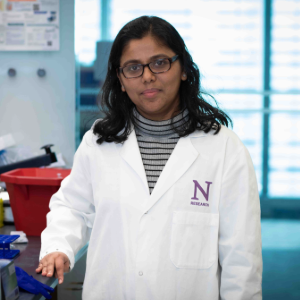
October 2024 Newsletter

October 2024 Newsletter

Sponsored Research
Crismita Dmello, PhD, research assistant professor in Neurological Surgery, has received her first R01 grant from the National Institute of Neurological Disorders and Stroke (NINDS) titled, “The immunosuppressive function of Checkpoint kinase 2 in gliomas.”
Dmello shared the aims of the project, her next steps and how she hopes this grant will propel glioblastoma research and her own lab.
Tell me about the grant you received.
This R01 grant from NINDS is focused on understanding theimmune suppression in glioblastoma. What we are proposing here is that we've identified a gene called checkpoint kinase 2 (Chek2). And we see that when you inhibit Chek2, we increase immune response and in case of glioblastoma, which is traditionally not known to respond to any therapies, this is really important. Glioblastoma (GBM) is a grade 4 brain tumor with that responds poorly to immunotherapy. Hence, it is mportant to understand the mechanism, by which Chek2 regulates immunesuppression in glioblastoma. And once we understand the interactions of this kinase and we understand how it modulates the immune response, we will be able to target Chek2 and its interactions together to reverse immune suppression and then a potential response to immunotherapy.
What are the aims of the project?
We have three aims, I will outline.
Together, this project will elucidate the mechanism underlying the immunosuppressive function of Chek2 and will provide a novel therapeutic strategy combining YBX1 inhibition, Chek2 inhibition and PD-1 blockade for testing in GBM patients.
What are your next steps?
Now we are actually carrying out the work. I have a postdoc, a medical student, and a master's student and together we have formed a team. And as a research assistant professor, I’m working through to the process to apply to start my own lab, and I'm looking forward to when that will materialize sometime next year. For now, we are really getting into the project to prepare to increase the immune response in glioblastoma and eventually take our work to preclinical and then clinical trials.
What do you hope will come out of this funded research?
The goal of this project is to increase the response of glioblastoma to immunotherapy. The standard care for glioblastoma is radiation, surgery and chemotherapy. Unfortunately, all three modalities fail, and 100 percent of glioblastomas recur. So, there is no such treatment that is available to date. Many different research groups are looking at different modalities that have worked for other cancers like melanoma, lung cancer, to learn from them and then apply to glioblastoma. Glioblastoma is a different entity, which is in the brain, and it is protected from immune system and is very heterogeneous. Targeting the cancer is very difficult, but we are using the knowledge of the biology of glioblastoma and the mechanism of the players that play a role in the cancer, and then using that in the context of immunotherapy.
It's one of the approaches to increase the response and hopefully, increases the survival in glioblastoma patients. What I envision is that as the project progresses, we come up with an inhibitor of YBX1, Chek2 and combine it with PD-1, block it and test it on glioblastoma patients to see whether this therapy is helpful.